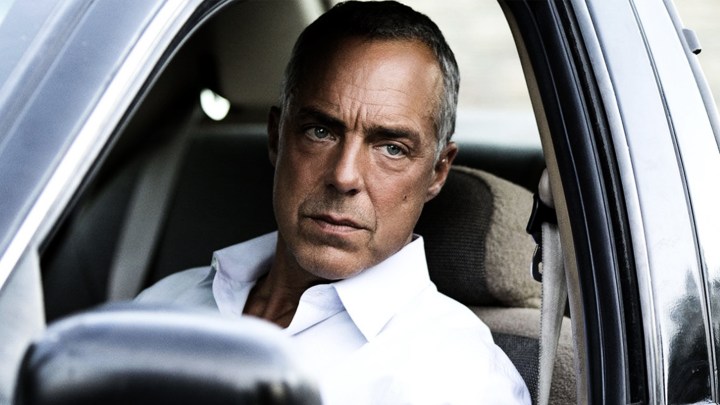SPONSORED CONTENT
Showmax: They just don’t make ’em like Bosch any more

If the only Bosch you know is the manufacturer of your fridge, you’ve been missing one of the most gritty and authentic contemporary police procedurals on TV, which throws classic elements of the genre and the stark broodiness of California noir in for free.
Bosch, Season 4 launched earlier this month in the United States, and in South Africa on Showmax on 20 April, with Season 5 being ordered hot on its heels. The crime drama follows LAPD homicide detective Hieronymus (Harry) Bosch — yes, he shares a name with the 15th-Century painter who created scenes of depraved violence with a “world gone mad” feel to his works. The author Michael Connelly, who created the series based non-chronologically on his crime novels, saw the name as fitting for his detective, who is moving through a fictional Los Angeles that resembles the hellish landscapes of the painter, and trying to make sense of it.
Connelly’s Bosch investigates murders committed in and around Hollywood. Adapted for TV by Eric Overmyer, the series is a masterpiece of clear and concise storytelling, making it a binge-watching gift that just keeps giving for fans of crime dramas and police procedurals.
But Bosch is more than a traditional cop show: its 10-episode seasons have given film buffs plenty to swoon over through the years.
The soul of the series
Writing for the New York Times about the launch of the fourth season of Bosch, critic Mike Hale says that “the soul of the series is procedural crime solving”, and when it comes to knotty plots and red herrings, Bosch delivers in spades. In each season, two or more concurrent cases have the detective and his partners racing around LA, climbing the Hollywood hills, interrupting movie casting sessions and knocking on trailer park doors chasing suspects.
While in structure the series is more like The Killing or Broadchurch than a standard network procedural, since a new crime isn’t introduced in every episode, it’s also been compared to the iconic 1950s cop series Dragnet, which was also set in LA.
One reason for the comparison is that Bosch (Titus Welliver) is cut from the same cloth as any number of classic TV cops. He’s a maverick, a wild card, a man who won’t be told what to focus on. His job is to put perps away (he speaks with great relish about suspects getting “the needle”, though in real life, the last time a prisoner got the death penalty in California was in 2006), and he’ll be damned if internal affairs or his superiors attempt to meddle in his work. He’s got a reputation for being a loose cannon, but he doesn’t care – unless it stands between him and the job.
Casting for detectives
Fans of Lost will recognise Titus Welliver as The Man in Black, and viewers of The Good Wife will remember him as the ruthless Glenn Childs, Peter Florrick’s rival for the position of State Attorney. But once you’ve seen him as the tight-lipped, deeply moral, obsessively hard-working Harry Bosch, you’ll never be able to imagine him playing any other role.
Welliver’s detective is well matched with his more flamboyant but equally watchful and reticent partner Jerry (played by Jamie Hector, who you’ll recognise as Marlo Stanfield from HBO’s The Wire, where he plays a character on the opposite side of the law in an altogether different sort of crime show) and his boss Deputy Chief Irving (Lance Reddick in a Saturn Award-nominated role; Reddick also starred in HBO’s The Wire as a senior official in the police department), who gets straight to the point in any conversation, however brutal.
A man with baggage
No police procedural worth its salt would have a lead without some serious issues in his past. We find out in Season 1, episode 1, when Bosch is on the stand after shooting a suspect in a case involving murdered prostitutes, that his own mother used to work the streets, and her murder was never solved.
As if being haunted by his mother’s death wasn’t enough, Bosch also has an ex-wife, a former FBI agent who is now a professional poker player in Las Vegas, where she lives with their daughter. And like many TV cops before (and after) him, Bosch’s dedication to his job means he struggles to have a relationship with his teenage kid, though by Season 3 they enjoy – or don’t – an almost-typical father-daughter affinity.
But unlike the leads in other shows in the genre, Bosch doesn’t dwell on his history, and any soul-searching he does is of the strictly pragmatic kind. His entire life is about the cases at hand.
(Southern) California dreaming
In the sprawling city of Los Angeles, where bright young things flock to secure themselves famous futures, Bosch discovers that sometimes “pretty-boy young actors” grow up to beat their wives and abuse their kids; that lawyers who are about to come up against the LAPD in court get murdered before they can present their case; dead pornographers get found in car boots; and homeless war vets get killed in cold blood for no discernible reason.
This air of pessimism and gloom about the state of the world, and LA in particular, will be familiar to connoisseurs of film noir, a term usually applied to stylish Hollywood thrillers made in the 40s and 50s in post-war US.
But Bosch has a particular flavour of noir, and it’s unique to crime thrillers set in Southern California. LA is a city of highways and hills, of strip malls and bleak skies, of lavish luxury and grinding poverty. Joan Didion described California as the place where “beneath that immense bleached sky… we run out of continent.” And it is this sense of brooding, desperation and fear that imbues the cinematically beautiful, dramatically framed scenes in Bosch with an unshakeable discomfort.
Watch the cold, enigmatic killer known as Raynard Waits applying makeup to cover his bruises after a run-in with Bosch and team in Season 1, the camera pulling in so tight that the whole screen is filled with the tiny brush painting his swollen eye pouches, and do your best not to squirm in your seat. It is shots like these you won’t find in any old cop show.
The sound of silence
Another thing that sets Bosch apart from its peers in the crime drama genre is its almost complete lack of backing track and artificially rendered audio. After the title sequence, the episodes unfold in a stark near-silence that adds to the show’s hyper-realistic, unsettling effect. Scenes are shot in real-life LA locations, and the only sounds other than the minimal dialogue are thanks to the locations themselves, and were supplied during filming.
Film buffs, crime drama fanatics and anyone on the hunt for fodder for their next binge-session should tuck into Bosch on Showmax, which is the only place in South Africa where this hidden gem can be found. DM
All four seasons of Bosch are available first and only on Showmax. Also available to stream are The Good Wife and The Wire. Showmax offers a 14-day free trial and comes at no cost to DStv Premium customers. Sign up to watch here on Showmax.

















 Become an Insider
Become an Insider